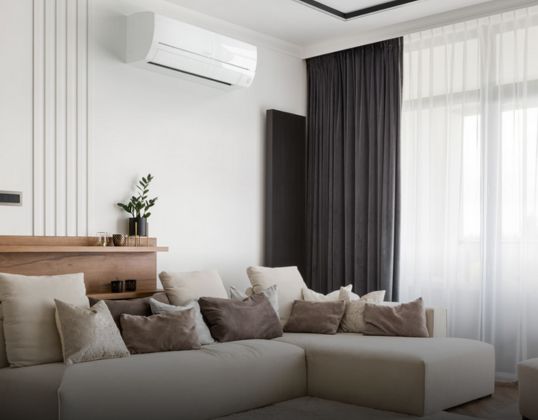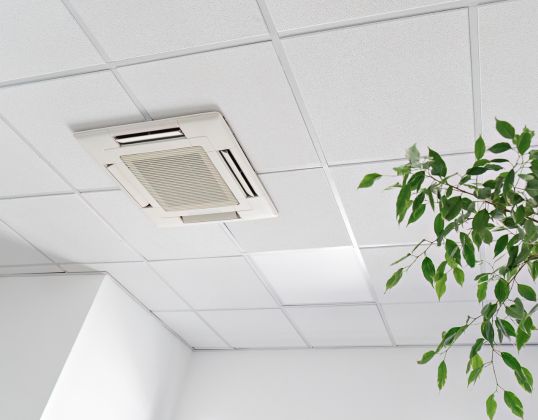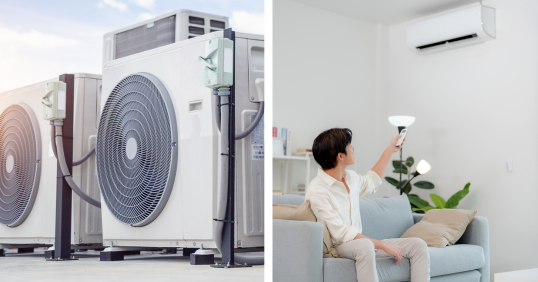Air conditioning is essential for maintaining comfort and productivity, whether at home or in a commercial space. However, residential air conditioning and commercial air conditioning systems are designed differently to meet distinct cooling needs. From capacity and installation complexity to energy efficiency and maintenance, there are key factors to consider when selecting the right HVAC system.
If you’re wondering how to choose the right AC unit, this guide breaks down the differences between home and commercial AC solutions—helping you make an informed decision. Specialising in high-quality systems across domestic and commercial environments, we cover a wide range of sectors, including whole homes, garden offices, hotels & leisure facilities, gyms, workplaces, schools, server rooms, medical premises and retail stores. Whatever your needs, with Mechcool, you can guarantee your air conditioning installation, maintenance, and servicing requirements will be met.
Understanding Residential and Commercial AC Needs
Home Air Conditioning Needs
Homeowners typically prioritise comfort, affordability, and energy efficiency when choosing an air conditioning system. Residential air conditioning units are designed for smaller spaces, focusing on efficient and quiet operation, aesthetic appeal, and smart thermostat integration.
Key considerations for home AC systems include:
- Compact and energy-efficient units that cool smaller areas effectively.
- Minimal noise levels to ensure comfort without disruption.
- Smart thermostats and automation for better temperature control and energy savings.

We specialise in installing a diverse selection of domestic air conditioning units tailored to meet various residential requirements. Whether you’re looking for a sleek and discreet unit or an energy-efficient system, we can install:
- VRV / VRF Systems
- Split Systems
- Downflow / Close Control Units
Find out more about our domestic air conditioning services.

Business Cooling Needs
Cooling demands are much higher for commercial settings like hotels, offices, retail stores, gyms, and factories. Commercial HVAC systems must cater to larger spaces, higher occupancy, and extensive equipment loads, requiring more powerful and durable systems.
Considerations for business cooling solutions include:
- Consistent airflow and zoning capabilities to accommodate different areas.
- Stronger cooling capacity to handle multiple occupants, lights, and machines.
- Longer operational hours, requiring higher efficiency and durability.
- Tailored solutions for unique business types:
- Office air conditioning for workplace productivity.
- Air conditioning for retail shops to keep customers comfortable.
- Gym air conditioning to maintain fresh airflow during workouts.
- Factory cooling systems to regulate equipment temperature and enhance employee comfort.
- Hotel and leisure facility air conditioning to enhance guest experience and maintain comfort.
- Server room cooling to protect sensitive IT equipment from overheating.
- Medical premises air conditioners to maintain stable temperatures for patient care and equipment functionality.
- School and educational facility cooling to create a comfortable learning environment for students and staff.
We leverage decades of industry expertise to design and implement air conditioning solutions that align with each business’s unique requirements. We ensure the seamless integration of the following commercial air conditioning systems:
- VRF / VRV Systems
- Split Systems
- Downflow / Close Control Units
Find out more about our commercial air conditioning services.
Key Differences Between Residential and Commercial Air Conditioning Systems
1. Size and Cooling Capacity
Residential air conditioners are typically smaller, ranging from 2kw and 7kw, sufficient for cooling homes and small apartments. These systems are designed to handle lower cooling demands and shorter operational durations. In contrast, commercial air conditioners require significantly higher cooling capacities of up to 78kw for large commercial spaces such as warehouses, retail environments, and office buildings. The higher tonnage ensures that these spaces maintain consistent airflow and climate control, even with high foot traffic and heat-generating equipment.
2. Installation Complexity and Location
The installation process varies significantly between residential and commercial AC systems. Home air conditioning units are usually installed in gardens, or wall mounted, ensuring easy access and minimal disruption to the living space. Meanwhile, commercial AC units are often rooftop-mounted, which helps businesses save valuable space while improving ventilation efficiency. Since commercial installations involve larger-scale systems and sometimes extensive ductwork, professional AC installation is crucial to ensure peak performance, longevity, and compliance with building regulations.
3. Power Consumption and Efficiency
Home systems are designed for intermittent use, meaning they do not consume as much power over long periods. Residential units operate only when needed, significantly reducing overall energy consumption. On the other hand, business AC solutions are built for extended operational hours, making energy efficiency a critical factor in managing running costs. Energy-efficient HVAC for offices and commercial buildings helps lower electricity bills and reduce environmental impact while maintaining consistent temperature control throughout the workday.
4. Maintenance and Longevity
Maintenance requirements are another key differentiator. Homeowners can typically maintain their AC units with annual servicing, ensuring optimal efficiency with basic tasks like filter cleans and refrigerant checks. However, commercial units demand frequent and more intensive maintenance due to their heavy usage. Regular servicing is essential for avoiding costly breakdowns. We offer regular AC maintenance plans to ensure your commercial system operates efficiently year-round.
6. Cost and Budget Considerations
Cost is an important factor in choosing an AC system. Residential AC units are generally more affordable upfront, with lower installation and operational costs. Since they are used intermittently, energy expenses are relatively moderate. Commercial HVAC systems, however, involve a higher initial investment due to their size, complexity, and installation requirements. Despite the higher upfront cost, businesses benefit from long-term savings by choosing energy-efficient models that reduce operating expenses. Investing in a reliable commercial HVAC system from Mechcool ensures durability, cost-effectiveness, and improved energy performance over time.
Contact Us
Understanding the differences between residential and commercial air conditioning is essential when choosing the right system for your space. Whether you’re a homeowner looking for efficient cooling or a business in need of a robust HVAC system, selecting the right unit ensures optimal comfort, energy efficiency, and cost savings. Investing in a system that suits your specific needs will provide long-term benefits and improve air quality.
Looking for expert advice? Contact us today and let our professionals help you find the perfect air conditioning solution!

